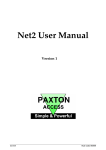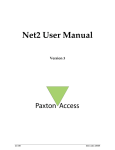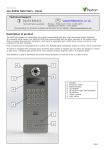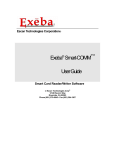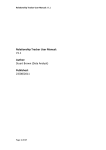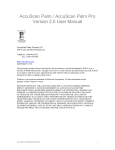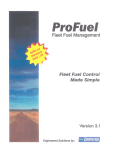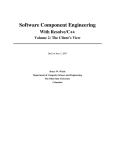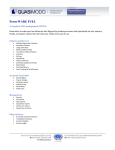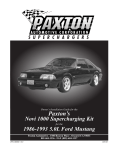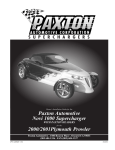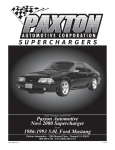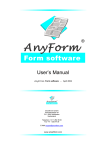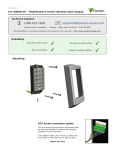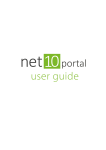Download Net2-user-manual-v2
Transcript
Net2 User Manual Version 2 ins-113
Date code: 171201 Contents
Chapter 1 Introduction ................................................................. 5
This manual ............................................................................................. 5
Manual layout.................................................................................... 5
References to areas of the Net2 program ....................................... 5
Overview – system ............................................................................... 6
Overview – Net2 hardware ....................................................................... 7
Overview – Net2 software ................................................................ 7
Chapter 2 About… ............................................................................. 9
Net2 software .......................................................................................... 9
Net2 software - View options ....................................................... 10
Main window .................................................................................. 10
Treeview window ........................................................................... 10
Shortcut window............................................................................. 10
Toolbar.............................................................................................. 10
Drop down menus .......................................................................... 10
Net2 software – The structure ............................................................... 11
The program .................................................................................... 11
The database .................................................................................... 11
The Net2 server ............................................................................... 11
System communication .................................................................. 12
Doors – General information ........................................................ 13
What are doors?............................................................................... 13
Doors ......................................................................................................... 13
Reinstate ........................................................................................... 13
Replace.............................................................................................. 14
Delete ACU ...................................................................................... 14
Detect ................................................................................................ 14
Refresh firmware............................................................................. 14
Doors\[Door name] ........................................................................... 14
Door name........................................................................................ 15
Door open time................................................................................ 15
Unlock the door during.................................................................. 15
Apply ................................................................................................ 15
Open door ........................................................................................ 15
Contents
1
Doors\[Door name]\Reader 1 ..................................................... 15
Name................................................................................................. 15
Reader type ...................................................................................... 15
Keypad ............................................................................................. 15
Card data format ............................................................................. 16
Reader operating mode.................................................................. 16
Timed operating modes ................................................................. 16
Reader action ................................................................................... 17
Doors\[Door name]\Reader 2 ..................................................... 17
Doors\[Door name]\Alarm .......................................................... 17
Local alarm....................................................................................... 18
Testing the local alarm ................................................................... 18
Alarm reporting at the PC ............................................................. 18
Doors\[Door name]\Codes ........................................................... 19
Doors\[Door name]\Events.......................................................... 19
Timezones - General information .............................................. 20
What is a timezone? ........................................................................ 20
What are timezones used for? ....................................................... 20
Timezones ............................................................................................... 20
Timezones\[Timezone name] ...................................................... 21
Adding timeslots............................................................................. 21
Deleting timeslots ........................................................................... 21
Dragging and dropping ................................................................. 21
Start time and End time windows ................................................ 21
Copying and pasting ...................................................................... 21
Public holidays ................................................................................ 22
Apply ................................................................................................ 22
Access levels – General information ........................................ 22
What is an access level?.................................................................. 22
Access levels .......................................................................................... 23
Access levels\[Access level name]............................................. 24
Users – General information ......................................................... 25
Users .......................................................................................................... 25
Departments .................................................................................... 25
Users\[User name] ............................................................................. 26
General information........................................................................ 26
Pictures ............................................................................................. 26
Access rights .................................................................................... 26
Users\[User name]\Cards.............................................................. 27
Lost cards ......................................................................................... 27
Users\[User name]\Other details and Memo ..................... 27
Contents
2
Users\[User name]\Events ............................................................ 28
Users\[User name]\Current validity ....................................... 29
Events – General information ...................................................... 29
Events ........................................................................................................ 30
Event search..................................................................................... 31
Event filtering .................................................................................. 31
Reports – General information .................................................... 31
Reports – Running the default reports .................................... 32
All events (last week, this week, today, yesterday).................... 32
Expired cards ................................................................................... 32
First and last events ........................................................................ 32
Last known position of users......................................................... 32
List all users ..................................................................................... 32
Who’s been in today ....................................................................... 32
Reports – Adding a new report .................................................... 32
Standard ........................................................................................... 33
Advanced ......................................................................................... 33
Net2 operators – General information ..................................... 33
Operator privileges ......................................................................... 33
System engineer .............................................................................. 33
Supervisor ........................................................................................ 33
Card Administration ...................................................................... 33
Standard (Read only)...................................................................... 33
Events only....................................................................................... 33
Net2 operators....................................................................................... 34
Options – General information ................................................... 35
Options\General ................................................................................ 35
PIN length ........................................................................................ 35
Week starts on ................................................................................. 35
Desktop reader ................................................................................ 35
Default pictures ............................................................................... 35
Options\Departments...................................................................... 36
Options\Field names........................................................................ 37
Options\Card types .......................................................................... 38
Options\Card data formats ........................................................... 39
Options\Backup.................................................................................. 40
System backup................................................................................. 40
Event backup ................................................................................... 41
Options\Public holidays ................................................................ 41
Other features ....................................................................................... 42
Print................................................................................................... 42
Contents
3
Other features\Import wizard ..................................................... 42
Other features\Find user ................................................................ 44
Other features\Open door ............................................................. 44
Other features\Update wizard .................................................... 45
Chapter 3 What if the system is not working? 47
Is the problem genuine? .................................................................. 47
Simple checks ....................................................................................... 48
Paxton Access technical helpline ................................................ 49
Chapter 4 Appendix .................................................................... 51
Appendix (i) Difference between code and PIN explained ................................................................................................. 51
Appendix (ii) Glossary .................................................................. 52
Appendix (iii) Upgrading from V1 to V2.................................. 53
Chapter 5 Specifications ........................................................... 55
Contents
4
Chapter 1 Introduction This manual Net2 system overview This manual
Manual layout
Section
Description
Net2 system overview
An introduction to the system.
About…
In depth information about all aspects of the
Net2 software. This section is split up into the
different sections of the program i.e. Doors
contains information on everything found in
the Doors icon in the treeview.
What if the system is not
working?
Basic test and faultfinding information.
Appendix
Information that is referred to throughout the
document.
Specifications
Full system specification.
References to areas of the Net2 program
The Net2 software uses a Microsoft Outlook style user interface. Areas of
the Net2 program are referred to throughout this document with Microsoft
Outlook style ‘addresses’. For example Timezones\Working hours refers to
the part of the program shown in this section. References are always shown
in italics.
Chapter 1 Introduction
5
Overview – system
Net2 is a revolutionary system with hardware and software developed
simultaneously to meet the requirements of a modern day access control
system. The hardware uses the latest in microchip technology allowing
unprecedented levels of speed, resilience and cost. The software is based on
the latest Windows interface and is developed to enable powerful
functionality whilst maintaining ease of use.
An access control system is an investment. The Net2 system ensures the
future proofing of that investment in several ways:
• Latest microchip technology offering solid, capable hardware
platform
• Use of FLASH memory allowing easy upgrades
• Software can be extended in functionality with ‘Modules’
• System can be extended with no redundancy of equipment
The system is capable of controlling up to 200 doors and 10,000 users. For
systems larger than this please contact the Paxton Access support
department.
Chapter 1 Introduction
6
Overview – Net2 hardware
Ease of wiring
Clearly labelled terminals on every access control unit remove the need for
continual referencing to wiring diagrams. Clear colour coding of reader
cables leads to fewer mistakes.
Diagnostic LEDs
An array of LEDs on the control unit indicate the status of key system
features. This will aid commissioning and quick diagnosis of any problems
should they occur.
FLASH Memory
FLASH memory in the access control units allows the downloading of new
firmware to the control units from the PC. This will mean that as new
features are added to Net2, systems in the field can be upgraded to allow the
use of the latest software features without any changes to the hardware.
Open architecture
Relay outputs and digital and analogue inputs allow integration with the
hardware of other systems.
Latest technology
State of the art electronic components create a solid hardware platform,
which is both high performance and compact.
Scaleable architecture
The system will be scaleable. The smallest system will be expandable to the
largest system using the same hardware building blocks and virtually no
redundancy of hardware as the system expands.
Communications
Very high speed and resilient communications offer real time alarm
reporting and the capability for very large systems.
Distributed intelligence
The Net2 single door control units provide full distributed intelligence down
to individual doors. This gives greater system resilience and makes support
and problem diagnosis easier. Also, event information can be retained when
the system is running offline (2,300 events).
Multi-technology
The same control unit will support magstripe (Clock and data), Wiegand
26bit, keypads and proximity, mixed on a single site if required.
Overview – Net2 software
Open architecture
Microsoft Access database allows easy linking of data to other software
systems.
Ease of use
Easy to learn, intuitive user interface working in Microsoft Windows 98,
NT4 and 2000 environments.
Ease of commissioning
Auto detection and numbering of access control units. No DIP switches to
set or binary numbering to worry about, switch on the software and go!
Chapter 1 Introduction
7
Modular
The software has the capacity for features to be added as and when they are
required. The modular structure enables the user interface to be as powerful
as required whilst remaining simple.
Comprehensive range of features
All the basic features required to control access privileges of users with
respect to time and create reports on the events happening around the
system. Many advanced features have been added in version 2 of the
program, a list of these additional features is included in the Appendix. Full
details of all system features are documented in the About… section.
Chapter 1 Introduction
8
Chapter 2 About… Net2 software Doors Timezones Access levels Users Events Reports Net2 operators Options Other features Net2 software
The Net2 software is based on the Microsoft Outlook style user interface.
This provides an excellent graphical interface allowing easy access to all
system features. Windows users will find this style of interface familiar
enabling fast, intuitive learning. Many Windows features such as drag and
drop and right mouse button click have been included in Net2.
Chapter 2 About…
9
Net2 software - View options The screen shot shows the three windows of the Net2 software. In addition
to these windows there are drop down menus and a task bar.
Main window
This is where events, user details, settings etc are displayed. The size and
shape of this window can be changed to suit.
Treeview window
This is the Explorer style window that is used to navigate around the
program. This is optional and can be turned on and off in the View drop
down menu.
Shortcut window
This is the bar of shortcuts on the left of the screen. There are shortcuts to
the different areas of the program allowing navigation around the program
without the use of the treeview. This is optional and can be turned on and
off in the View drop down menu.
Toolbar
The toolbar, at the top of the display, has buttons accessing some features
directly (Print, Find user and Open door – for details see About…\Other
features). Also included are Internet Explorer style navigation arrows, these
allow the operator to flip back through areas of the program just visited.
Drop down menus
The drop down menus feature shortcuts to areas of the program as well as
system settings and configuration options.
Chapter 2 About…
10
Net2 software – The structure
The Net2 software consists of three main components, the program, the
database and the communications server. These are all installed onto a
single PC.
The database is where all system information is stored. The program is a
front end user interface designed to make viewing and editing the database
information easy.
The program
This is the actual Net2 program that an operator uses to change and view
system details. This is installed from CD but does not require the CD to run.
The default location for the program is C:\Program files\Access
Control\Net2\Net2.exe.
The database
The main database is called Net2System.mdb. This database stores all of the
information that is specific to an individual system such as user details, door
details, configuration, timezones etc as well as event information. It is
created the first time that the Net2 program is run and the default location is
C:\Net2 access control. If the Net2System database is lost, corrupted or
deleted then the whole system will have to be reconfigured unless a backup
copy can be reinstated (for information on backup refer to
About…\Options\Backup).
The Net2 server
The Net2 server is the program that deals with the communication between
the database and the Net2 hardware (control units). The server is
continuously checking the database for changes and asking the control units
if they have anything to report.
The server is installed with the Net2 software but is run independently of
the program. The default setting is that the server is always running in the
background. A Net2 icon can be seen in the bottom right corner of the
Windows task bar when the server is running.
The default location for the server is C:\Program files\Access
Control\Net2\Net2Svr.exe.
Chapter 2 About…
11
System communication
Net2System.mdb
Net2 program
Connection from
PC COM port links
to RS485/232 c onverter
Net2 server
RS485/232 c onverter
links to Net2 c ontrol
units.
PC
The diagram shows the basic structure of the Net2 software.
Example 1:
1.
An operator changes a user’s validity using the Net2 program.
2. When the operator presses the Apply button these changes are stored in
the database.
3. The Net2 server will detect that a change has been made to the database
and make sure that the revised information is downloaded to the
relevant control units.
4.
Once the control units have been updated, the new validity is active.
Example 2:
1.
A user presents their token and passes through an access point on the
system.
2.
The next time that the server asks the control unit if it has any
information to download (each control unit is polled around 10 times
per second) the control unit will download the event information to the
server.
3.
The server will store the event information in the database.
4.
An operator can view the event information using the program.
Note: Even though there are several steps in each of the examples, actions
and events will appear instantaneous due to the speed of each process.
Chapter 2 About…
12
Doors – General information
What are doors?
The Net2 system is designed to control access through doors. Doors in the
treeview window refers to the doors controlled by the system. Each control
unit is designed to control a single door.
Doors
General information about the control units at each door is shown including
name of the door, serial number of the control unit, the current version of
firmware and the status of the control unit. If the status is OK then the
control unit is communicating with the software correctly.
Reinstate
All system settings and user access rights etc. are stored in the database on
the hard drive of the PC controlling the Net2 system. In addition to this,
information relevant to each individual door is stored at the relevant control
unit. This Distributed intelligence offers greatly increased system resilience
and speed of decision making.
The Net2 software automatically updates the Net2 database AND the
information in the Net2 control units when a change is made. If there has
been a problem with communications, and the information in the control
units is not correct, then the database information can be re-sent by
Reinstating the control units.
The information on the database is always taken as being correct. If
incorrect decisions are being made at the door then check the settings on the
database (i.e. the information displayed in the Net2 software).
Chapter 2 About…
13
Replace
If a control unit fails and needs to be replaced, the Replace wizard is used.
The new control unit must be wired into the system and detected (using the
Detect button). Once detected the control unit will appear in the main
display window. The Replace wizard can now be run and will ask you to
select the new control unit and the one to be replaced. The software will
automatically download the relevant system settings and user details etc.
Delete ACU
This is used if a control unit needs to be permanently deleted from the
database.
Detect
This will search the network for Net2 control units. Those found are
displayed in the main window.
Refresh firmware
This function is used to upgrade the firmware on the control units. The
firmware is the program that controls the operation of the control units.
Because Net2 uses FLASH memory, the firmware can be upgraded from the
PC via the network. As more features are developed for Net2, upgrade
software will be available (including upgraded firmware).
Doors\[Door name]
The settings for each control unit are configured in this screen. The ACU
serial number is shown in the top left corner of the main display. The lower
section of the main display has tabs that allow access to the different settings
(Reader1, Reader2, Alarm, Codes and Events). Sections are accessed by
clicking on the relevant tab.
Chapter 2 About…
14
Door name
When the system is first powered up, the control unit name will be the same
as the serial number. A descriptive name should be given to a control unit.
This name will appear in the list of doors.
Door open time
The door open time is the amount of time that the output relay is switched
for (the amount of time that the locking mechanism is released). The default
setting is 7 seconds. This can be modified within the range 1 to 5000
seconds.
Unlock the door during
This feature allows the user to select a timezone in which the locking
mechanism is released. If the working hours timezone is selected, the door
will be open during working hours. An example of where this may be
useful is where a receptionist is present to greet visitors during office hours.
The main door can be left open so that anybody can walk in. Out of working
hours the door is automatically locked and a valid user card is required to
gain access.
A door can be held open during any timezone. For more information on
timezones refer to About…\Timezones.
Apply
When any changes are made to the door settings the Apply button must be
pressed to commit the changes to the database.
Open door
The open door feature will release the locking mechanism for the door open
time.
Doors\[Door name]\Reader 1
The Reader 1 tab shows the settings corresponding to Reader 1 and Keypad
1 connected to that control unit.
Name
The default name for reader 1 is [Door name] (IN). The default name for
reader 2 is [Door name] (OUT).
The reader names set here will appear in reports and be used to set access
levels.
Reader type
This should be set to the relevant type of reader.
Setting
Description
None
If no reader is connected.
Paxton reader
If a CARDLOCK or PROXIMITY reader is
connected.
Clock and data
If a non – Paxton clock and data reader is
connected
Wiegand
If a Wiegand reader is connected.
Keypad
This should be set to the relevant type of keypad.
Chapter 2 About…
Setting
Description
None
If no reader is connected.
Paxton keypad
If a TOUCHLOCK keypad is connected.
15
Card data format
Every card enrolled on a Net2 system must have a unique number. The card
data format option allows Net2 to use cards and tokens with a variety of
encoding formats.
The default setting is for the Net2 encoded cards and tokens (random 8 digit
number).
Setting
Description
Default
This is for Net2 encoded cards and tokens
(random 8 digit number).
Paxton cards
This is for CARDLOCK and PROXIMITY
cards and tokens (encrypted number).
Bank cards
This allows Net2 to use bank cards.
Refer to About…\Options\Card data formats for more detailed information.
Reader operating mode
The correct operating mode should be selected from the drop down menu.
Setting
Description
Inactive
There is no reader or keypad connected (or
they are inactive for some other reason).
Card only
Access is granted by swiping a valid user card.
Card plus PIN
Access is granted by swiping a valid user card
AND entering the relevant PIN.
Card plus code
Access is granted by swiping a valid user card
AND entering a valid code.
Desktop reader
A desktop reader is connected. This reader is
to be used to add users to the system.
PIN only
Access is granted by entering a valid PIN.
Code only
Access is granted by entering a valid code.
Card or PIN
Access is granted by swiping a valid card OR
entering a valid PIN.
Card or code
Access is granted by swiping a valid card OR
entering a valid code.
Card, PIN or code
Access is granted by swiping a valid card OR
entering a valid PIN OR entering a valid code.
For information on the difference between PIN and code, refer to
Appendix\Difference between code and PIN.
The list of operating modes displayed in the drop down menu is dependent
on the reader type and keypad type settings. For example, if a keypad is
configured without a reader, only Inactive, Code only and PIN only will be
displayed in the drop down menu.
Timed operating modes
This feature allows a different operating mode within a timezone. For
example, card plus PIN may be required outside working hours and card
only within working hours.
To configure this, select the required timezone from the drop down menu.
Select the required operating mode from the other drop down menu.
Chapter 2 About…
16
Reader action
This is the action that will happen when access is granted.
Setting
Description
Relay 1 - door open time
Access granted will open relay 1 for door open
time.
This can be used for temporarily releasing
electric locking mechanisms.
Relay 2 - toggles
Access granted will toggle relay 2. For
example, a valid card will open relay 2. The
relay will remain open until another valid
card is presented.
This can be used for switching an alarm
system on and off, opening shutter doors etc.
Doors\[Door name]\Reader 2
The Reader 2 tab shows the settings corresponding to Reader 2 and Keypad
2 connected to that control unit.
The default name for reader 2 is [Door name] (OUT). This can be changed.
All settings are set as shown for reader 1. Readers 1 and 2 are configured
separately and can have completely different settings.
Doors\[Door name]\Alarm Chapter 2 About…
17
There are 4 types of alarm that can be configured for each ACU.
Type of alarm
Description
Requires…
Door forced open
The door is opened without the permission of
the access control system.
Door contact
Door left open
The door is opened with the permission of the
access control system but is not closed within
the specified time.
Door contact
PSU failure
The mains supply to the control unit PSU fails.
If battery backup is fitted then the system will
continue to operate.
Mains fail output on power
supply
Tamper
The control unit enclosure has been opened.
Tamper switch on control unit
enclosure
Each type of alarm has its own tab and is configured in the same way. The
settings for each type of alarm can be different.
Local alarm
On every control unit there is an alarm output. This can be connected to a
bell, sounder, light etc. The local output can be turned on or off for each
type of alarm.
If the local alarm is activated then a delay can be imposed before the alarm is
activated. It can also be configured in a particular way to distinguish
between different alarm events. The alarm can be set to sound continuously
or can be configured manually.
Testing the local alarm
The local alarm can be tested by activating it and silencing it from the PC.
Alarm reporting at the PC
All alarm events are reported at the PC. A delay can be imposed before an
alarm event is sent.
Chapter 2 About…
18
Doors\[Door name]\Codes Note: The Codes tab only appears if a keypad is configured on the control
unit.
Codes can be simply added and deleted. Codes added in this screen will
only be valid for the individual door.
Up to 50 codes can be valid at any one time. Codes can be between 4 and 8
digits long.
Doors\[Door name]\Events
This screen simply displays the events that have happened at that control
unit.
Chapter 2 About…
19
Timezones - General information
What is a timezone?
Term
Description
Timezone
A series of timeslots.
Timeslot
A start and stop time on a particular day of
the week.
A timezone is made up of several timeslots. A simple example of a timezone
is the default Working hours timezone. This has 5 timeslots:
9am-5.30pm Monday
9am-5.30pm Tuesday
9am-5.30pm Wednesday
9am-5.30pm Thursday
9am-5.30pm Friday
This is a simple example of a timezone. Timezones can have several
timeslots per day (total number of timeslots is 2048 maximum). This allows
for break times, night shifts and more complicated timezones.
Maximum number of timezones is 64.
What are timezones used for?
The Net2 system has many functions that depend on the time and day of the
week. For example, a user can be set to have access at particular times on
particular days of the week. Timezones are used to make this as simple as
possible, i.e. the user can be made valid within a timezone.
Once a timezone is set up, it can be used for any feature requiring a
timezone.
Timezones
The main window displays the timezones that have been setup on the
system.
There are 3 default timezones that cannot be deleted (although the working
hours default timezone can be modified).
Timezone
Description
At no time
At no time on any day of the week
All day, every day
24 hours per day, every day of the week
Working hours
9am-5.30pm Monday to Friday
Timezones can be added, deleted or renamed by either clicking on the right
mouse button or using the buttons at the bottom right corner of the main
display window.
Chapter 2 About…
20
Timezones\[Timezone name] The main window shows a graphical display of the selected timezone.
Adding timeslots
New timeslots can be added by holding the left mouse button and dragging
the pointer.
Deleting timeslots
Timeslots can be deleted clicking the ‘Delete’ the button in the bottom right
hand corner of the main display window.
Dragging and dropping
Timeslots can be moved by dragging and dropping. This is done by holding
the left mouse button down and moving the pointer whilst the timeslot is
selected. The start and end times of a timeslot can be adjusted to the nearest
15 minutes by dragging the end of the timeslot.
Start time and End time windows
These appear in the bottom left hand corner of the main display window.
When a timeslot is selected the start and end times are displayed. The
timeslot can be adjusted to the nearest minute using up and down arrows.
Copying and pasting
Clicking on the right mouse button whilst a timeslot is selected will activate
cutting, copying and pasting. An entire sequence of timeslots in one day can
be copied using the copy day feature.
Chapter 2 About…
21
Public holidays
As well as the 7 days of the week, there is an entry for public holidays. This
allows specific timeslots to be set up for days that are nominated as public
holidays.
For example, the Cleaners shift timezone could be set up to allow cleaners
access to the premises between 9am and 11am on public holidays.
For information on configuring public holidays refer to
About…\Options\Public holidays.
Apply
Once the timezone details are correct the changes must be applied for them
to be committed to the database.
Access levels – General information
What is an access level?
An access level is a level of access permissions, i.e. where in a building a
user is allowed. A common requirement of an access control system is to be
able to set different access permissions for different groups of users.
Sometimes the access permissions will be dependant on the time and day of
the week, for example a user may only be allowed into the office during
standard working hours.
An access level may be given the name of the group of users that it is for
(such as factory workers). An access level is set by selecting an appropriate
timezone for each reader. Users given an access level will be able to gain
access during the timezone specified for that reader. For example, if we
want to limit access through the main entrance to during working hours, we
select the working hours timezone next to the main entrance reader.
The maximum number of access levels on a system is 250.
Chapter 2 About…
22
Access levels
The main window displays the access levels that have been setup on the
system.
There are 3 default access levels that cannot be deleted (although the
working hours default access level can be modified).
Access level
Description
At no time
Access is not permitted at any time on any
doors
All day, every day
Access is permitted on all doors, 24 hours a
day, 7 days a week
Working hours
Access is permitted on all doors only during
9am-5.30pm Monday to Friday
Access levels can be added, deleted or renamed by either clicking on the
right mouse button or using the buttons at the bottom right corner of the
main display window.
Note: It is not recommended to apply the all day, every day access level
to large numbers of users. This would prevent the access rights of these
users being changed as a batch when the site requirements change.
Chapter 2 About…
23
Access levels\[Access level name]
The main window displays the settings for the current access level.
Every reader on the system is displayed. Next to the reader name, a
timezone can be selected from the drop down menu. When a user is given
an access level, they will be permitted through the readers shown, during
the timezones shown.
The screen shot in this section shows that morning cleaners are allowed in
the car park at all times, out of the car park at no time and through all other
doors on the system only during working hours.
Apply
Once the access level details are correct, the changes must be applied for
them to be committed to the database.
Chapter 2 About…
24
Users – General information
‘Users’ refers to the people that use the access control system. Users are
identified to the system by a card, token or PIN (or a combination of any of
these). Once a user has been identified to the system, a decision can be made
on whether they are permitted or denied access.
Every user that has been entered onto the system has a user record. This
contains information regarding their access permissions, cards/tokens, PINs
and any other details required.
Users
The users on the system are displayed in the main window. If departments
have been configured then these will also be displayed.
Departments
Departments allow users to be grouped. This is particularly useful when
there are a large number of users on the system. Having users grouped
together by department enables quick reporting and viewing of users.
For more information about setting up departments, refer to
About…\Options\Departments.
Chapter 2 About…
25
Users\[User name] General information
Name, telephone number, department and personnel number can be
recorded if required.
Valid from and Valid until indicate the dates between which the user is
valid. Visitors for example can be configured so that their card automatically
expires after one day. Contractors or temporary staff can be configured to
be valid between certain dates.
The default setting for the Valid from date, is the date that the user is added
to the system. This can be changed using the drop down calendar. The
Valid until date is inactive as default. If required it can be marked as active
and a date can be selected from the drop down calendar.
The user can be barred from all doors by pressing the Bar user button.
A users complete record can be deleted by pressing the Delete record
button. This will completely remove the user record from the database.
WARNING - This action cannot be undone.
Pictures
A picture of the user can be imported into the user record. A picture can be
imported by pressing the Get picture button. Bmp, jpg, gif, wmf and emf
formats are supported.
Pictures can be deleted by pressing the Delete picture button.
When a picture is imported into a user record, a copy is made and stored in
C:\Net2 access control\Pictures.
Access rights
The user can be assigned an access level from the drop down list, refer to
About…\Access levels.
Alternatively Individual permissions can be selected. This allows the exact
access of each user to be configured completely independently. This is often
used in sites with few users.
Chapter 2 About…
26
Users\[User name]\Cards The main display shows the cards that are assigned to the user. As many
cards as required can be assigned to a user (the overall system limit is 10,000
cards). Cards can be added by either entering the card number manually
OR by presenting or swiping the card at the desktop reader. Cards can be
deleted completely by pressing the Delete card button.
Lost cards
If a card is marked as lost it will be automatically invalid on all doors at all
times. If it is presented at any reader on the system an alarm event will be
generated.
Users\[User name]\Other details and Memo Chapter 2 About…
27
Details can be entered for every user on the system. Default user detail
fields are: Address 1, Address 2, Town, County, Post code, Home telephone,
Home fax, Mobile, E-mail, Position, Start date, Car registration and Memo.
The 16 user detail fields can be modified as required. For more information
refer to About…\Options\Field names.
Note: Field names can be edited by double clicking on them (unless
disabled in Options).
Users\[User name]\Events
This tab displays the events for that user. This can be useful if trying to
locate a user in a large building, simply go to the user record and see where
they presented their card last. The events in this screen can be sorted by any
of the columns by clicking the left mouse button over the column header.
Chapter 2 About…
28
Users\[User name]\Current validity This tab shows where the user is currently valid. The readers on which the
user is currently valid will be highlighted.
Events – General information
An ‘Event’ is the report of an incident that has occurred on the system. For
example, when a user presents their card and is permitted access at a door,
an event is sent to the PC. The event documents the user concerned, the
reader at which they presented their card, the time and date etc.
The following incidents produce an event:
Chapter 2 About…
Event
Description
User access permitted
A user has been permitted access.
User access denied
A user has been denied access.
Door opened with exit
button
Exit button has been used.
Door opened with
network instruction
Door has been requested open by software.
Operator logon
An operator has logged onto the Net2 software.
Operator Logoff
An operator has logged off of the Net2 software.
ACU online
The control unit is communicating with the PC.
Control unit reset
The control unit has been reset.
Desktop reader
A card has been presented or swiped at the
desktop reader.
Door forced open
A door has been opened without the permission
of the access control system.
Door left open
A door has been left open for longer than the
specified maximum time.
29
Tamper
The control unit enclosure has been tampered
with.
Mains fail
The mains supply to the control unit has failed.
Card not valid – card
reported as lost
A card that has been marked as lost has been
used on the system.
ACU not responding
The control unit is not communicating with the
PC.
If the PC is switched on, events will be reported almost immediately. If the
PC is switched off, the event will be held at the control unit (2,300 event
buffer) until the PC is next switched on.
Events
The main display shows the events in date/time order. The most recent
events are displayed at the top.
Date/time, user and location are recorded as well as a description if the
event.
The events are reported in real time. The green and red buttons at the top
left corner of the main display control the flow of events. The red button
will stop the events screen being updated. The green button will allow
events to be reported immediately.
Chapter 2 About…
30
Event search
Events may be searched for keywords. A search can only been performed
when the red button is pressed, i.e. the event screen is not being updated.
The text to search for is entered into the text box at the top of the screen.
Pressing the binocular icon will search for any events containing this text.
The events with matching text will be displayed.
For example, to search for events at the front door type ‘front door’ in the
text box and press the binocular icon.
Event filtering
Events displayed can be filtered by time and type of event.
The time span over which the events appear in the event screen can be
selected from the drop down menu. The options are: Show last hour, Show
today, Show last 7 days and Show all.
The type of event that is displayed in the event screen can be selected using
the icons at the top of the screen. The options are: Show system events only,
Show alarm events only, Show access events only and Show all event types.
Note: Double clicking an event involving a user will automatically open
their user record. Double clicking an alarm event will give the option to
acknowledge the alarm, changing the icon colour to green.
Reports – General information
Reports can be produced on various aspects of access control system. There
are a number of default reports. These can be run at any time. In addition to
the default reports, reports can be configured by the user. Once a report is
configured the ‘template’ can be saved and used whenever required.
All reports can be sorted by any of the fields (i.e by time, by user name) by
clicking on the column headers. Columns can be dragged and dropped into
any order required.
Chapter 2 About…
31
Reports – Running the default reports
Default reports are run by double clicking on the relevant icon.
All events (last week, this week, today, yesterday)
Displays all events that happened during the specified time period.
Displayed fields are: Date/time, User, Where, Event, Details.
Sunday is start of the week as default. This can be changed in
Options\General.
Expired cards
Displays all users with cards that have expired. Displayed fields are: User
name, Access level, Department, Valid from, Expires.
First and last events
Displays a list of all users with the time of their first and last events of today.
Also shown is the difference in hours between the two times.
Last known position of users
Produces a complete list of users along with location of their last event.
Displayed fields are: User name, Date/time, Where, Event, Description.
List all users
Produces a complete list of all users on the system. Displayed fields are:
User name, Access level, Department, Valid from, Expires.
Who’s been in today
Produces a list of the users that have used the system today. Displayed
fields are: Date, User name, Department.
Note: This is not a list of users currently in the building!
Reports – Adding a new report Chapter 2 About…
32
The report wizard is launched by double clicking the ‘New report’ icon. The
users (or departments) that the report is required for are selected. The
relevant readers are selected from the list. Finally the time period for the
report is selected. The time period can be set in two ways:
Standard
The time scale of the report is selected from the drop down list. Options
include: Today, Yesterday, This week, Last week, This month, Last month,
This year and Last year.
Note: If the report is saved to be used again, a time scale from this menu
should be selected.
Advanced
The time scale of the report can be selected between a particular date range.
Start and end dates can be selected from the drop down calendars.
Net2 operators – General information
The term ‘Net2 operator’ relates to a person that has access to and uses the
Net2 software. The Net2 software can have up to 50 operators.
Operator privileges
Net2 operators can be assigned different privileges allowing them various
levels of access to the features of the system. Operator privileges are split up
into 4 levels:
System engineer
Full access to all system features.
Supervisor
Full access to all system features apart from deleting and replacing a control
unit (and refreshing firmware).
A supervisor cannot upgrade the Net2 software (only System engineer).
Card Administration
Everything can be viewed but only user records can be edited. Reports can
be run but not created.
Standard (Read only)
Everything can be viewed but nothing can be edited.
Events only
Only events can be viewed. Nothing can be edited.
Chapter 2 About…
33
Net2 operators
The new operator wizard is launched by double clicking on the ‘New
operator’ icon.
Before an operator can be added, they must first be a ‘User’ on the system.
Select the new operator from the drop down list of users. Select the required
operator privilege from the drop down menu. Get the new operator to type
in their password and confirm it.
Note: Only System engineers and Supervisors can create operators.
Supervisors cannot create System engineer operators.
Chapter 2 About…
34
Options – General information
Options can be accessed from the drop down menu at the top of the screen.
All system wide settings are configured in Options.
Options\General
PIN length
PIN stands for Personal Identification Number. If there are any keypads on
the system then PINs can be used to identify users. PINs can be between 4
and 6 digits long.
Week starts on
The default setting is that the week starts on Sunday. This can be modified
if required.
Desktop reader
If there is more than one desktop reader on the system, this selects which is
used.
Default pictures
A default picture can be set for each card type (for more information on card
types, refer to About…\Options\Card types). Bmp, jpg, gif, wmf and emf
formats are supported.
A copy of any picture used is stored in C:\Net2 access control\Pictures.
Chapter 2 About…
35
Options\Departments Users can be grouped together by department. This is particularly useful
when there are a large number of users on the system. Having users
grouped together by department enables quick reporting and viewing of
users.
Any number of departments can be created. The name of the new
department is simply entered into the text box. The new department is
added to the list by pressing the Add button. Departments can be deleted
and renamed using the relevant buttons.
Departments will be displayed in the treeview window and the main
display window.
Chapter 2 About…
36
Options\Field names In the user records there are 16 fields that are user definable. The default
settings for these fields are: Address 1, Address 2, Town, County, Post code,
Home telephone, Home fax, Mobile, E-mail, Position, Start date, Car
registration and Memo. Any of these fields can be modified as required.
There is an option that allows the field names to be changed by double
clicking on them in the user record. This can be enabled/disabled.
Chapter 2 About…
37
Options\Card types Card types can be created with default settings for:
Valid from
Valid until
Access level
Department
All 16 user definable fields
When adding a new user, simply select the card type and all of the required
fields will be set automatically. This is particularly useful where lots of new
users are being added and many of their details are the same.
To add a new card type press the Add button. Enter the name of the card
type in the text box and press the tick icon to accept. Select the Valid from
date from the drop down calendar. Select the Valid until date from the drop
down list. The simple options for Valid until are:
Card never expires
Card valid today only
Card expires after Monday
Card expires after Tuesday
Card expires after Wednesday
Card expires after Thursday
Card expires after Friday
Card expires after Saturday
Chapter 2 About…
38 Card expires after Sunday
Card valid this month only
Card valid this year only
If advanced is selected, a date can be selected from the drop down calendar.
Select the access level from the drop down list. Select the department from
the drop down list. Enter values for any of the 16 user definable fields.
Once all of the details are correct, the Apply button commits all changes to
the database.
As many card types as required can be added.
Card types can be deleted and renamed using the relevant buttons.
Note: Visitor is set up as a default card type.
Options\Card data formats
The Net2 system identifies users by reading an 8 digit number from their
user card/token. Each user has to have a unique number for the system to
recognise them. If cards other than the Net2 cards are used, only a portion
of the data on the card may be unique. It is possible to configure the Net2
system to look at the unique part of the card information.
A new card data format can be configured by pressing the Add button.
Enter the name of the new data format in the text box and press the tick icon
to accept. Select the part of the card data that is unique by adjusting the
settings as required.
Chapter 2 About…
39
The settings can be tested by entering a card number (or swiping through
the desktop reader). The way that Net2 will interpret the information is
displayed.
Note: To implement a card data format, it must first be selected in Doors,
refer to About…\Doors\{Door name]\Reader 1.
Card data formats can be deleted and renamed as required.
Options\Backup
System backup
All system settings and user details are stored in an Access 7 database
(Net2System.mdb). If this database is corrupted or deleted, the system will
have to be reconfigured and all user records will be lost. For this reason it is
essential that a backup copy of this file is made on a regular basis.
The Net2 software creates backup files automatically. A separate copy of the
Net2System.mdb database is made every day the software is used. The
backup file for a day has the date included in the file name (Net2System
YYYYMMDD.mdb). The backup file is created either:
1.
When the application is closed down
OR
2.
At the automatic backup time as set in Options\Backup
If a backup file has already been created for that day, the file will be over
written with the most current version of the database.
The retention period dictates the number of days that the backup files are
kept for.
Note: Backup files should be saved on a different drive to the
Net2System.mdb file.
Chapter 2 About…
40
Event backup
10,000 events are stored in NetSystem.mdb. These are the events that are
displayed in the event screen. In addition, 12 months worth of events are
stored in Net2Events.mdb.
Events are automatically archived to the backup folder. The archived event
files are split into individual years (i.e. Net2 Events 1999.mdb and Net2
Events 2000.mdb).
Options\Public holidays
Certain days can be nominated as public holidays. Days can be added to the
list of public holidays using the drop down calendar.
When a day is nominated as a public holiday, the validity of users will
depend on the public holiday settings in Timezones, refer to
About…\Timezones\[Timezone name].
Chapter 2 About…
41
Other features
Print
The print feature can be accessed from the toolbar at the top of screen and
can be used to print events and reports.
Note: If only part of the events screen/report is required, highlight the
relevant section and press Print. Only the highlighted area will be
printed.
Other features\Import wizard
The import wizard can be accessed from the drop down File menu at the top
of the screen.
Using the wizard it is possible to import user details from an external file.
For example, if a sports club has a database of its users, all of the user details
can be downloaded straight into the Net2 system thus preventing duplicate
data entry.
The user information must be saved as a TXT (Text) or CSV (Comma
Separated Variable) file. Fields can be comma, semi-colon or tab separated.
The fields must be in the order as shown in the table. (Note that only the
first 2 fields are required)
Chapter 2 About…
42
Field number
Net2 field name
Notes
1
*
Surname
Required – Text up to 50
characters
2
*
Firstname
Required – Text up to 50
characters
3
*
Middlename
Text up to 50 characters
4
CardNo
Number 1000 to 99999999
5
PIN
Number 1000 to 999999
6
*
Department
Text up to 50 characters
7
*
Access Level
Text up to 50 characters
8
Telephone
Text up to 50 characters
9
Extension
Text up to 50 characters
10
Fax
Text up to 50 characters
11
Active date
Date in the default language
format e.g. in the UK it is
dd/mm/yyyy
12
Expiry date
Date in the default language
format e.g. in the UK it is
dd/mm/yyyy
Field1_100 (Address 1)
Default field name shown in
brackets
13
*
Text up to 100 characters
14
*
Field2_100 (Address 2)
Text up to 100 characters
15
*
Field3_50 (Town)
Text up to 50 characters
16
*
Field4_50 (County)
Text up to 50 characters
17
Field5_50 (Post code)
Text up to 50 characters
18
Field6_50 (Home telephone)
Text up to 50 characters
19
Field7_50 (Home fax)
Text up to 50 characters
20
Field8_50 (Mobile)
Text up to 50 characters
21
Field9_50 (Email)
Text up to 50 characters
Field10_50 (Position)
Text up to 50 characters
23
Field11_50 (Start date)
Text up to 50 characters
24
Field12_50 (Car registration)
Text up to 50 characters
Field13_Memo (Notes)
Text up to 65535 characters
(cannot contain field separator).
Field14_50 (Personnel number)
Text up to 50 characters
22
25
*
*
26
The text file can be browsed to from the import wizard. The correct field
separator must be selected from the list.
The first row can be ignored if it contains the field names. Check the box if
required.
Text can be converted to true text if required (i.e. SMITH becomes Smith).
Only the fields marked with an asterisk (*) in the table are affected by the
‘Convert to true case’ option. Check the box if required.
Chapter 2 About…
43
Other features\Find user The find user wizard can be accessed from the toolbar at the top of the
screen. If there are a large number of users on the system, it may save time
to use the find user wizard. The whole name or any part of the name can be
searched for.
The users are listed alphabetically by surname. Up and Down refer to the
direction the wizard will look for its next match.
Note: When the Users icon is highlighted in the treeview, typing the first
few letters of a users surname will jump to their record.
Other features\Open door
The open door wizard can be accessed from the toolbar at the top of the
screen. Any doors on the system can be made to open for door open time
from the software.
Chapter 2 About…
44
Other features\Update wizard The update wizard can be accessed from the drop down Help menu at the
top of the screen (Check for update option).
Note: An Internet connection is required to use this wizard.
The wizard will check the Internet for any software upgrades available. An
upgrade should only be performed by the installation company. A backup
copy of the database should be made before the upgrade is attempted.
Note: Only operators with System engineer operator privilege have
access to the update wizard.
If any problems are experienced when upgrading please contact the Paxton
Access technical helpline.
Chapter 2 About…
45
Chapter 2 About…
46
Chapter 3 What if the system is not
working?
Is the problem genuine? Simple checks Paxton Access technical helpline Is the problem genuine?
Experience at first hand that the problem is genuine. Reported faults are
invariably caused by user error. False alarms may be generated by:
•
Incorrect swiping of a magstripe card
•
Worn or damaged magstripe cards
•
Proximity token not presented within read range
•
Incorrect procedure at the PC (changes not being applied for example)
If a genuine problem has been identified, firstly make sure that the problem
can be duplicated. Document the exact nature of the problem, this will
enable your installer and the Paxton Access technical help department to
solve the problem quickly.
Once the problem has been identified, duplicated and documented, perform
the simple checks in the next section.
Chapter 3 What if the system is not working?
47
Simple checks
Firstly, exit the Net2 software and reboot the PC. If problems persist…
Problem
Check…
Events are not reporting in the Events screen
Check the green update button is pressed in the
Events screen. If the red button is pressed, it will
prevent the screen from being updated.
Check that events are actually occurring on the
system.
Check that none of the filters are active on the Events
screen. Select Show all from the drop down list and
press the Show all events icon.
Doors are not opening when cards are presented
Go to a door where the problem has been reported
and ensure that the reader LEDs are on. If they are
not then the reader has no power. Check mains
supply and contact installer.
If the red LED is flashing when a card is presented,
check the validity of the user at the PC.
If the green LED is flashing when a card is
presented, check the connections to the locking
mechanism. Call out installer if required.
User validity is different from that shown on the
software
Check any changes that are made using the software
are applied (press Apply).
Ensure that the Net2 server is running. If not,
double click on C:\Program files\Access
Control\Net2\Net2Svr.exe.
Press the Reinstate button in the Doors screen. This
synchronises the information in the database and the
control units.
Control units are showing as not responding in
Doors screen
Check that the RS485/232 converter has power.
Check that the RS485/232 converter is connected to
the COM port of the PC.
Check the mains supply to the control units.
Ensure that the Net2 server is running. If not,
double click on C:\Program files\Access
Control\Net2\Net2Svr.exe.
Chapter 3 What if the system is not working?
48 Paxton Access technical helpline
Paxton Access offer a telephone technical help service. This is designed to
assist customers with technical problems. Many technical problems can be
solved by following advice given over the phone, however many problems
will require an installer to attend site.
To qualify for technical support, a valid technical support ID number is
required. This number is generated from the software and can be accessed
by selecting Technical support in the Help drop down menu at the top of
the screen. The technical support ID number will only be valid if the
software had been registered.
To assist our technical help staff to diagnose any problems quickly please
ensure that:
•
The person calling has full details of the problem at first hand
•
The person calling has a working knowledge of the Net2 system
• Details of the system are at hand i.e. number of doors/users, type of
readers
• The person calling has read this manual and has followed its guidelines
and simple checks
•
The person calling has the technical support ID number The Paxton Access technical helpline is available Mon-Fri 8.30am-5.30pm.
+44 (0) 1273 480291
Chapter 3 What if the system is not working?
49
Chapter 3 What if the system is not working?
50
Chapter 4 Appendix
(i)
Difference between code and PIN explained (ii) Glossary (iii) Upgrading from V1 to V2 Appendix (i) Difference between code and PIN explained
PIN stands for Personal Identification Number. This is a number that is
specific to an individual user. A user code can be common to many users.
Example of code only: A keypad has two codes to control the access of
1,000 users through an access point. 300 users use one code and 700 use the
other.
Codes are very quick to setup; thousands of users can be given access to an
area if the code is disclosed. Access privileges can be adjusted for groups of
users, where the users are grouped together by a common code.
Example of PIN only: A keypad controls the access of eight users through a
door. Each of the eight users has their own PIN, which they use to gain
access.
Using PINs mean that access rights can be changed for every individual
without affecting other users. PINs also allow users to be identified by the
system for reporting purposes. However, more numbers valid on a keypad
will increase the chances of guessing a correct number. This means that a
non-authorised person can gain access by randomly pressing keys on the
keypad. To reduce these risks to an acceptable level it is necessary to
increase the number of digits in the PIN.
Example of card plus code: A proximity reader and a keypad are used to
control access through a door. A user is required to present their proximity
card to the reader and enter a valid code.
This involves two elements of security – possession and knowledge. The
possession of the card is required AND a valid code has to be known. If the
card is lost it cannot be used on its own. If the code is discovered it cannot
be used without a valid card.
Example of card plus PIN: A magnetic stripe reader and a keypad is used
to control the access through a door. A user is required to swipe their card
and enter their PIN number. Only the combination of that user card AND
that user PIN number is acceptable.
This involves both possession and knowledge but increases security even
further. If a user card is lost it can only be used to gain access when used
with the specific PIN number. For security reasons bank cash machines use
a card plus PIN system.
Appendix
51
Appendix (ii) Glossary
General access control terms
Access control system
An access control system comprises input for identification (e.g. a keypad
or reader), intelligent electronics for decision making and outputs for
operating access point hardware and the access point hardware itself (e.g.
locks, barriers).
Access Control Unit (ACU)
A general term to describe a range of devices which have the control
electronics and intelligence to make the decision to allow access at one or
several points. It will have connectors or cables ready to link to readers,
keypads, locks, etc.
Access level
An access level is a particular level of access privileges with relation to
time.
Coercivity
Coercivity relates to the resilience of the encoding of a magnetic stripe card.
Hi coercivity encoded magstripe cards are more resilient to data corruption
than Lo coercivity cards.
Distributed intelligence
In a networked access control system access control units are linked and
communicate with each other or a PC used to control the system.
Distributed intelligence means that the access control units hold user
information and system settings locally. This enables the ACUs to carry on
functioning if communications links are severed.
Door open time
An electric locking device has power supplied/denied to release and allow
access when a valid token is presented. The time period that the electric
release is energised/de-energised is referred to as the door open time.
Event recording
Access control units may be provided with memory to record events.
Events recorded should include the access point details, date, time and user
ID for each occasion when access is granted. Many other events may be
recorded depending on the system e.g. details of access denied and alarm
events. Where events are recorded the access control unit will be capable
of sending the information to a printer or computer.
Magstripe
Magnetic stripe reading technology – cards with a number encoded on a
magnetic stripe are swiped through a slot on a reader.
Network system
A system where access control units are linked together by data cable for
the exchange of information between units. The purpose of this is to
provide easier configuration and better management information for larger
and more complex applications. All access points on the system can be set
up from a single point. The access control units on network systems record
events. Most systems allow for a computer to be connected to the network
to allow control and reporting to be carried out from a dedicated program.
Photo ID
Where a photograph of the user is printed or attached to their user token
allowing them to be identified.
Proximity
The proximity device is held close to the reader and sends a unique
number by radio signal to the reader.
Timeslot
A timeslot is a time period on a particular day of week. An example of a
timeslot is between 9am and 5pm on Tuesday.
Timezone
A timezone is a combination of timeslots in a week. An example of a
timezone is Working hours between 9am and 5pm Mon to Fri.
User token
This is a generic term for the devices that users of an access control system
use to identify themselves and gain entry through access points. User
tokens may be magstripe cards, proximity keyfobs, smart cards, etc.
Appendix
52 Paxton Access terminology
Proximity ISO card
ISO cards are the same size as standard bank or credit cards. They can be
used with standard card printers for photo ID. They also have a magnetic
stripe that can be encoded for use with other systems such as vending.
Proximity keyfob
Keyfobs are for applications where convenience is important. They are
made of hard plastic and will fit onto a keyring. They can be attached to
car/house keys for reduced losses, hence reducing the cost of replacing
fobs.
Proximity card
Tokens are about credit card size but are thicker. They can be used from
inside wallets or handbags. Adhesive plastic stickers can be applied for
photo ID and the slot in the tokens makes them ideal for use with low cost
badge clips.
Appendix (iii) Upgrading from V1 to V2
Verify that the system is communicating correctly
1.
Run the Net2 software logged on as engineer
2.
Go to the Hardware screen and press the Detect button
3.
Check that each ACU has OK reported in the status column
To upgrade
Note: The PC will require re-booting during this procedure
1.
Shut down the Net2 software and ensure that the communication server
has also been shut down
2.
Shut down any other programs that are running
3.
Make a backup copy of the folder ‘Net2 Access Control’ – IMPORTANT
4.
Insert the V2.00 CD ROM and wait for the CD to auto run, alternatively
run setup.exe from the Net2 CD ROM
5.
Follow the on screen prompts
Ready to run
1.
Launch the Net2 software
2.
Go to the Doors screen
3. The firmware version should now be reported as V2.XX and all ACUs
should be reported as OK in the status column
Note: The Net2 communications server will automatically upgrade the
ACU firmware
Note: The communications server will be initialised whenever the
computer starts.
4.
Appendix
Check that events are being reported
53
Appendix
54
Chapter 5 Specifications Net2 standard plus software
Maximum number of users
Maximum number of doors per data line †
Net2 standard software
Maximum number of users
Maximum number of doors per data line †
Reading technologies supported
10,000
200
2,000
50
All Paxton Access readers: PROXIMITY, CARDLOCK
magnetic stripe, TOUCHLOCK keypads
All users, all access points
All users
Up to 250
Up to 64
Yes
Yes
Yes
unlimited
4 levels
Individual password protection
Provides fast access to user records
Yes
Reported to software and output for local sounder at door
Reported to software and output for local sounder at door
Screen reports on recent events
Yes
Microsoft Access 97
Yes - including Word, Excel, Access, etc
Manual backup required
Yes
1 to 5,000 seconds
Yes - all equipment that can be switched by clean relays
Individual access rights by access point
Individual timezones
Access levels
Timezones
Read in and read out
Card plus PIN (Personal identification number)
PIN only entry
Number of system operators
System operator privileges
System operator log on to software
Desk top reader
Advance entry of Bank Holidays
Door held / wedged open alarm
Door forced alarm
Instant reports
Printed reports from entire access event history
Database format
Data available to other programs
Timed backup of event log
Fail open (fail safe) locks
Door open time
Operates gates, barriers, turnstiles, etc
Network Details
Communications with other control units
RS485 full duplex 115,200 BAUD
Maximum number of control units
200
Full distributed intelligence
Yes
Off line memory in access control units
2,300 events
Access control unit user card capacity
10,000 Paxton Access proximity devices or magstripe cards
Access control unit user card capacity
10,000 bank / credit magstripe cards
Details of supported readers
Magnetic stripe readers
CARDLOCK
Reader life
>1,000,000 swipes
Proximity readers
PROXIMITY
Reader life
Unlimited token reads
Keypads
TOUCHLOCK membrane or TOUCHLOCK stainless steel
Keypad life (key presses)
>100,000 membrane or > 1,000,000 for stainless steel
Water resistance
All readers IPX7 (submersible) except membrane keypad IPX5
Finishes of CARDLOCK and TOUCHLOCK
Black, brass or satin chrome
Finish of PROXIMITY
Black
Finish of TOUCHLOCK stainless steel
Stainless steel and satin chrome
† Net2 standard and standard plus software support one data line
Minimum PC minimum specification: Pentium PIII/800 processor, 128 Mbytes RAM, UDMA hard disk with 1Gbyte free
space, 800 x 600, 256 colour monitor (SVGA), a free UART 16550 serial port, mouse, keyboard and a CD ROM drive.
Net2 is for use with Windows 98, Windows NT4 SP6 and Windows 2000. Windows XP should not be used.
Specifications
55 Network communications
Network communications cable
Maximum length of communications bus
Access Control Unit
Number of doors per control unit
Memory in the event of complete power failure
Backup batteries ensure operation of
Connections in the access control unit for each of the doors
Readers
Keypads
Analogue / digital inputs
5 amp relay outputs (NC, and NO)
1 amp FET controlled output
Reader to access control unit distances
TOUCHLOCK keypad *
TOUCHLOCK keypad stainless steel *
CARDLOCK reader *
PROXIMITY reader*
Access control unit power requirement details
Required supply voltage
Maximum current for access control unit
Maximum current for Paxton Access magstripe readers
Maximum current for Paxton Access proximity readers
Maximum current for Paxton Access keypads
Maximum current for other keypads and readers
Maximum current for locks
Access control unit dimensions
Board size
Recommended minimum space for board in other
manufacturer’s enclosures
Board weight
NETWORK RS485 / 232 communications converter
Size
Communications protocols
Maximum serial cable distance to PC
Low voltage power supply
Desktop reader details
Type of reader
Paxton Access dual technology desktop reader
Size of Paxton Access dual technology desktop reader
Maximum distance to access control unit
Black plastic housing
Size
Features
PSU enclosure size
Details to be confirmed
Belden® 8723 (individually shielded pairs) *
1,000m
1
All system settings and user details are retained for 7 days
Entire system except PC - control of access continues
1 or 2 (in, in/out)
1 or 2 (in, in/out)
4 (default uses: exit button, door contact, PSU monitor, tamper)
2 (default use: lock relay and door bell relay)
1 (sinks up to 1A at 12Vdc, default use: local door alarm)
30m
30m
100m
50m
9V to 15V dc
350mA at 12Vdc (allow extra for FET output)
65mA
70mA
45mA
See reader manufacturer’s literature
See lock manufacturer’s literature
102 x 116 x 30mm high
200 x 170mm high
190g
80 x 50 x 20mm
RS232 to PC, RS485 to access control units
7m
250mA 12V dc
The reader type used at the doors on site may be used or:
Reads magstripe cards and Paxton Access proximity devices
160 x 90 x 30 mm
As for other reader distances noted above
175 x 170 x 40mm
Tamper switch, cable tie loops, cable entry knock outs
* All reader and data cables should be segregated from mains power cables to avoid interference. IEE Regulations
and normal good practice should be observed. Belden cables or exact electrical equivalents must be used.
®Windows 95/98, Windows NT, Access, Excel and Word are Registered Trademarks of Microsoft Corporation Inc.
® Belden is a Registered Trademark of Cooper Industries Inc.
Specifications
56


























































